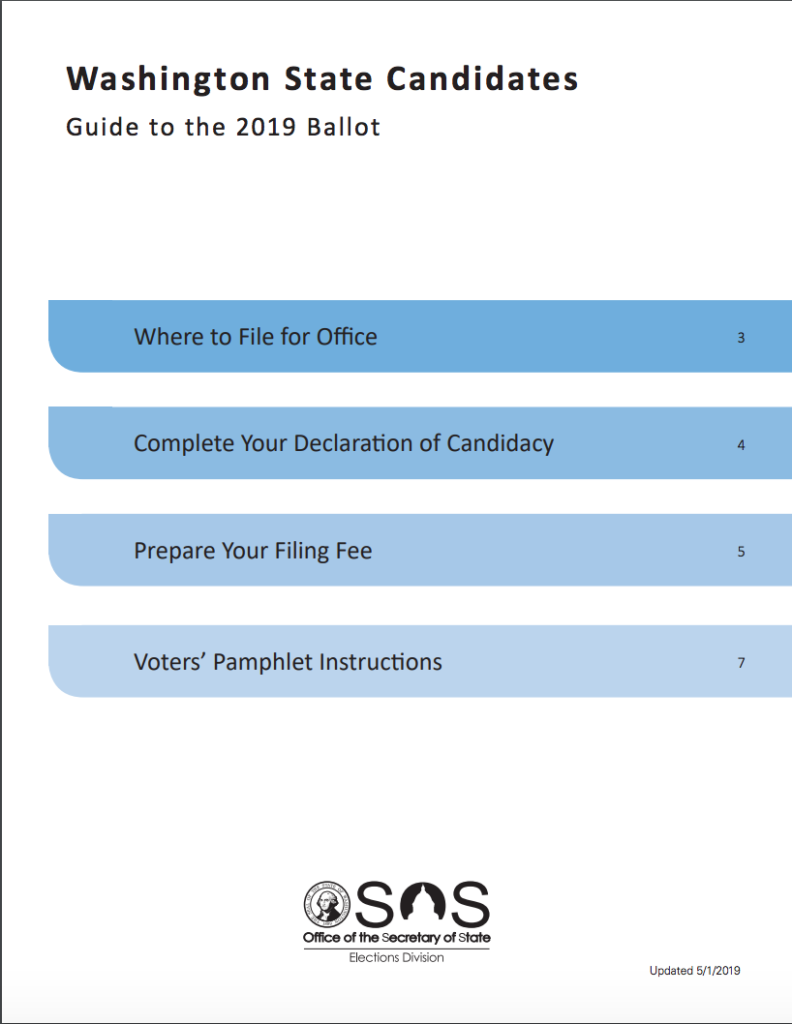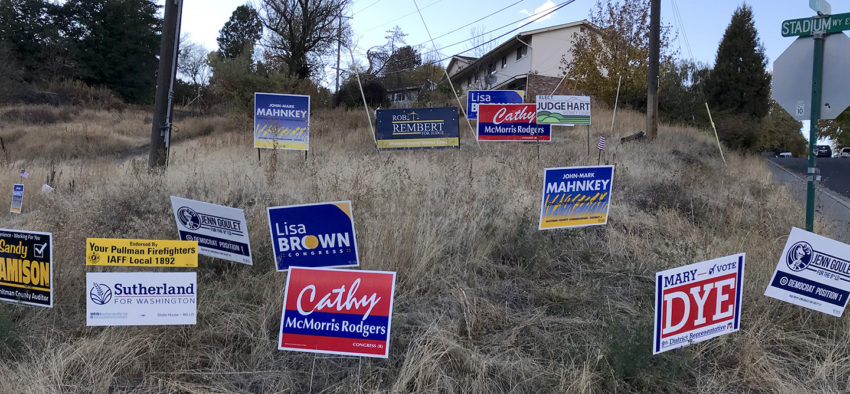Election archives show 80 percent of Whitman County’s regional and local races went uncontested in the past decade as community boards and taxing districts sometimes struggle to fill seats.
With candidate filing opening next week, the Auditor’s Office lists 210 positions up for election in November — ranging from Port of Whitman County commissioner to the St. John cemetery board. Auditor Sandy Jamison expected many of those races will go unchallenged as communities scramble to recruit new public servants.
“It takes a village to run a village,” she explained. “[But] we have a smaller population to draw from. … I know people who are sitting on two or three boards.”
Candidates can file in-person or online from May 13 through May 17. Jamison encouraged people to stop by her office next week to meet with election staff and go through the forms. Read more about the filing process and requirements below.
“I thought it would be more difficult than it is,” she said of filing. “It’s not nearly as daunting or intimidating as people think.”
Whitman County Watch compared more than 600 local General Election races dating back to 2008, including races for the U.S. 5th District, the state’s 9th Legislative District, county officials, mayors and city councils, school boards, fire commissioners and the hospital boards. The analysis did not include statewide and federal races such as governors or presidential races, nor did it include smaller taxing district boards for parks, sewers or cemeteries.
Of the 630 total races tallied, records listed 505 — or 80 percent — as uncontested.
At the state legislative level, Sen. Mark Schoesler has not faced an opponent in his past three races. State Rep. Joe Schmick has had challengers in three of his past six races for the 9th District. Rep. Mary Dye has won three contested races since her appointment to her seat in 2015.
Several countywide positions have gone without any challengers for the past 11 years including the county coroner, county clerk, prosecutor and Superior Court judge. Some of those positions transferred between elections as officials stepped down. Overall, about 74 percent of countywide races went uncontested since 2008.
Both county Commissioners Dean Kinzer and Art Swannack went uncontested in their most recent 2016 races. Commissioner Michael Largent saw two uncontested re-elections prior to his race against John-Mark Mahnkey last fall.
“I think it’s good for democracy to have challenges,” Largent noted during an Oct. 18 voter forum.
Judicial races for state and local judges rarely see challengers. The open race for Whitman County District Court last fall marks the only such contested election in recent history.
While City of Pullman mayoral or council races averaged 52 percent uncontested, the overall rates for city and town races from Albion to Uniontown averaged 78 percent uncontested across more than 260 races.
The Whitman County Gazette reported last year the town of Lamont faced potential disincorporation over a shortage of candidates to fill the five-person council.

Lamont Mayor Steve Ulrich told Whitman County Watch the town now operates with just three council members seated — the minimum for a quorum. Ulrich and two council members are up for election this fall in addition to the two empty seats.
“We’re doing good still,” he said recently. “It would be nice to have more [council members]. If someone gets sick we have to rearrange the meetings.”
Ulrich, whose wife also serves as one of the council members, said a couple people have expressed initial interest in running, but have not followed through. Some cite the time commitment and lack of pay.
“We don’t have a lot of choices,” Ulrich said, noting the town has just 70 or so residents. “That limits our pool a little bit.”
Rural school boards saw some of the highest rates of uncontested races with 87 percent (179 of the 206 races) going unchallenged. Whitman County has 16 separate school districts that fall within its boundaries — each with five-person school boards to fill.
The county’s 14 fire districts, four hospital boards and various other taxing district boards also saw high rates of uncontested races. The Gazette reported in 2015 about how uncontested races resulted in higher levels of under votes in which voters declined to mark any candidate or wrote in fictional characters.
Debbie McNeil, chair of the Whitman County Democrats, said some positions like Pullman City Council or the Pullman School Board see consistent challengers, but most elected seats do not. When approaching potential candidates, she said, many object to training requirements, demanding schedules or low compensation.
“We always want to fill the bench,” she said. “But we’ve found that our younger people are just not willing to do that right now.”
With busy family schedules and other commitments, McNeil said it can be easy to overlook the benefits of public service. Local representatives get to build leadership skills, connect with constituents and bring new perspectives to old problems.
“We’re always encouraging people to get involved,” she said. “These [boards] have opportunities for personal growth, professional growth and community service.”
Challengers inject new excitement and fresh debate into local democracy, McNeil said. Longevity in office builds experience, but also complacency.
“I do think something is lost,” she said, “when the same people are in the same positions for years and years.”
How to file for local office
Whitman County has hundreds of locally elected seats to fill. Here’s how you can run.
Candidates must submit the forms to put their names on the General Election ballot each May. Filing week opens at 8 a.m. May 13 and runs through 5 p.m. May 17 this year. You can file online here or you can visit the county Elections Center at 304 N. Main St. in Colfax to file in person.
Auditor Sandy Jamison said county election staff can provide valuable assistance with answering questions, submitting forms and paying any necessary filing fees.
“We will walk them through it on the computer,” she said.
The Secretary of State’s office notes those seeking office must be actively registered to vote in the district or subdivision they want to run for. So make sure you live within the jurisdiction of the board you want to serve on and check your voter registration status. Here’s an in-depth state FAQ guide.
Some positions require a non-refundable filing fee that corresponds to how much the position is paid. Unpaid positions do not require a fee. Positions that receive less than $1,000 a year in compensation require a $10 fee. Positions that earn more than $1,000 a year have a filing fee equal to 1 percent of the annual compensation. Those fees are also listed here.
Anyone who cannot afford a filing fee also has the option to collect a petition of voter signatures instead. They must collect one valid signature for every dollar of the position’s filing fee.
Jamison explained an individual may only have their name on the ballot once in an election, so he or she cannot run for positions on multiple boards in the same year.
Filing forms include several questions about a candidate’s preferred name for the ballot, preferred political party affiliation and campaign contact information. Jamison noted the contact information gets posted online after an individual files for office.
Any positions that draw more than two candidates will go to a primary race in August. If positions do not attract any candidates, Jamison said a three-day special filing period will be open from May 21 to May 23. If a race still remains unfilled, the incumbent has the option to stay on in the position.
Here’s the state candidates guide on filing. Jamison emphasized the filing process is fairly quick and straightforward, but it does need to happen during the filing window. Her office is happy to help. Then the real work begins.
“They become a public servant,” she said. “What it will take is the dedicated time after they’re elected.”
